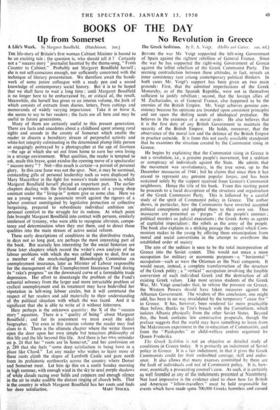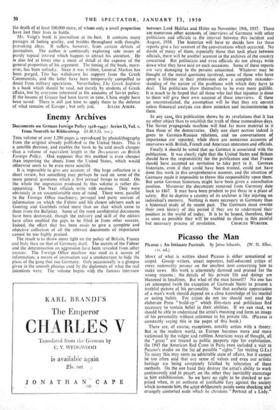The Greek Sedition. By F. A. Voigt. (Hollis and Carter.
los. 6d.) BEFORE the war Mr. Voigt supported the left-wing Government of Spain against the rightest rebellion of General Franco. Since the war he has supported the right-wing Government of Greece against the leftist rebellion of the Greek Communist Party. The seeming contradiction between these attitudes, in fact, reveals an inner consistency rare among contemporary political thinkers. In both cases Mr. Voigt's support has. been given on two main grounds: First, that the admitted imperfections of the Greek Monarchy, as of the Spanish Republic, were not in themselves sufficient to justify rebellion ; second, that the foreign allies of M. Zachariades, as of General Franco, also happened to be the enemies of the British Empire. Mr. Voigt achieves genuine con- sistency because his opinions are founded upon consistent principles and not upon the shifting sands of ideological prejudice. He believes in the existence of a moral order. He also believes that it is the first duty of any British Government to maintain the security of the British Empire. He holds, moreover, that the observance of the moral law and the defence of the British Empire in practice coincide. It is from this not easily assailable standpoint that he examines the situation created by the Communist rising in Greece.
He begins by explaining that the Communist rising in Greece is not a revolution, i.e., a genuine people's movement, but a sedition or conspiracy of individuals against the State. He admits that the movement was revolutionary, in the true sense, up to the December massacres of 1944; but he claims that since then it has ceased to represent any genuine popular forces, and has been sustained solely by the support received from Greece's Communist neighbours. Hence the title of his book. From this starting point he proceeds to a lucid description of the structure and organisation of the Greek Communist Party. This is followed by a careful study of the spirit of Communist policy in Greece. The author shows, in particular, how the Communists have inverted accepted political conceptions and adapted them to their own use. Thus massacres are presented as purges" of the people's enemies ; political murders as judicial executions ; the Greek Army as agents of capitalist imperialism ; the rebels as the army of the people. The book also explains in a striking passage the appeal which Com- munism makes to the young by offering them emancipation from moral and social conventions in the attempt to overthrow the established order of society The aim of the sedition is seen to be the total incorporation of Greece into the Soviet system. This would not mean a mere occupation for military or economic purposes--a " horizontal " occupation—such as were the Ottoman or the Nazi conquests. It would mean, instead, a complete transformation of the structure of the Greek polity ; a " vertical " occupation involving the forcible conversion of each individual Greek and the destruction of all existing Greek values. Like most serious students of the Greek War, Mr. Voigt concludes that, to relieve the pressure on Greece, the Western Powers should have taken measures against the Albanian Government. The wisdom of this conclusion, one might add, has been in no way invalidated by the temporary "cease fire '• in Greece. It has, however, been rendered far more practicable than before, thanks to Tito's breach with the Cominform, which isolates Albania physically from the other Soviet States. Beyond this, the book contains few constructive proposals, though the preface suggests that the world may have something to learn from the Makronesos experiment in the re-education of Communists, and from the " Paidopoles " or child-welfare centres organised by Queen Frederika.
The Greek Sedition is not an objective or detailed study of conditions in Greece today. It is primarily an indictment of Soviet policy in Greece. It is a fair indictment, in that it gives the Greek Communists credit for their undoubted courage, skill and endur- ance. It also allows that many excesses committed by them are the fault of individuals and not of Communist policy. It is, how- ever, essentially a prosecuting counsel's case. As such, it is certainly as well founded as any of the indictments presented at Nuremberg. Not least impressive is the evidence cited to show how far British and American " fellow-travellers " must be held responsible for events which have made some 700,000 Greeks homeless and caused
the death of at least 100,000 more, of whom only a small proportion have lost their lives in battle.
Mr. Voigt's book is journalism at its. best. It contains many passages of lasting quality, and bristles throughout with thought-
provoking ideas. It suffers, however, from certain defects of journalism. The author is continually exploring side issues of purely topical interest which happen to attract his attention. He is also led at times into a maze of detail at the expense of the general proportion of his argument. The timing of the book, more- over, has been unlucky. Since it was written, General Markos has been purged, Tito has withdrawn his support from the Greek Communists, and the latter have been temporarily compelled to desist from military operations. Nevertheless, The Greek Sedition is a book which should be read, not merely by students of Greek affairs, but by everyone interested in the anatomy of Soviet policy. If the lessons of Greece had been learnt in time, China might have been saved. There is still just time to apply them to the defence
of what remains of Europe ; but only just. JULIAN AMERY.































 Previous page
Previous page